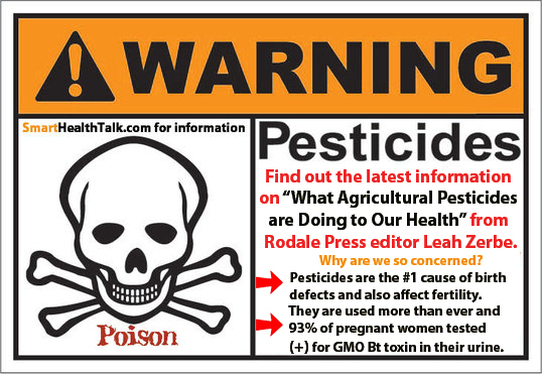|
|
|
|
Roundup Red Alert! What you need to know about the pesticide poised to "push us all off of the cliff"
The USDA just approved another GMO crop dependent on dousings of the pesticide Roundup. Here's what scientists say everyone who eats needs to know about this not-so-benign chemical By Leah Zerbe Rodale.com http://www.rodale.com/roundup RODALE NEWS, EMMAUS, PA””Last week, the United States Department of Agriculture (USDA) announced its decision to allow farmers who favor genetically engineered seeds to grow GMO alfalfa, also known as GE alfalfa, anywhere they'd like””even right up against a field of organic or non-GMO crops. Due to the very real risk that genes from GMO alfalfa will transfer to and contaminate the nation's organic and non-GMO alfalfa crops through cross pollenization, organic and conventional farming groups, dairies, consumer, and food safety groups have united to send a clear signal that a large portion of the population doesn't want GMO-laced food. But aside from the dire consequences for agriculture and consumer choice regarding GMO contamination””most Americans don't want GMOs in the food chain””the approval of GMO alfalfa raises other serious human health concerns involving the pesticide Roundup (generic chemical name: glyphosate). The new GMO alfalfa has been genetically manipulated in labs to withstand heavy sprayings of Roundup (created by Monsanto, the developer of the GMO seeds), a chemical commonly marketed as "safe" and "biodegradable," but one that scientists are actually learning has unhealthy effects on the human body, livestock animals we eat, and crops themselves. In fact, France’s highest court recently found Monsanto guilty of false advertising for claiming Roundup to be biodegradable. In reality, it takes months, or even years, depending on soil conditions, to break down. Millions of pounds of Roundup are dumped over and around food crops every year, and many people also use it to kill weeds in the yard or in household driveway and sidewalk cracks. No matter the route of exposure, science suggests we need to keep this chemical out of the food chain, not step up its use on more GMO crops. Here's what everyone””mothers, fathers, farmers, grocers, and anyone who eats”” needs to know about Roundup: Most Americans are unknowingly eating Roundup every day. Roundup is systemic, meaning it's taken up inside the plants exposed to it. Using veggie washes on your produce may remove some surface pesticides, but Roundup is likely in the actual vegetable, grain, fruit, or nut if it's sprayed on a field before plants are grown, or if it's sprayed around fruit and nut trees. “It’s the most abused chemical we’ve ever had in agriculture,” says veteran plant pathologist Don Huber, PhD, professor emeritus of Purdue University. “We’re using chemical quantities we never would have imagined in the past.” GMO "Roundup Ready" crops, like most of the soy and corn grown in this country and used in the majority of non-organic foods, tend to contain higher concentrations of Roundup. That's because farmers are having to use two to five times more of the chemical than a normal herbicide application, to kill weeds growing resistant to the overused chemical. (Note ”” GMOs, as well as Roundup and other toxic synthetic chemical pesticides, are banned in certified organic farming.) Roundup creates conditions for estrogenic toxin and neurotoxin buildup in food””and in us. Huber, one of the world's top researchers of glyphosate, says we're in "epidemic mode" right now in terms of plant diseases induced by Roundup use. These plant diseases could affect humans and livestock eating the diseased plants, too. As Jeffrey Smith, founder of the Institute for Responsible Technology, points out, some of the fungi that thrive on glyphosate produce harmful toxins that can enter the food chain, either in human food or animal feed. Smith cites a UN Food and Agriculture Organization report that links one such fungus, Fusarium, in the food chain to certain cancers, a blood disorder, and infertility in animals. Smith says USDA researchers have found a 500 percent increase in Fusarium root infection when glyphosate is used on Roundup Ready soybeans. (This toxin can also appear in corn, wheat, and other crops.) "Like glyphosate, Fusarium toxins accumulate in our bodies, too," says Huber. And when looking at all of the possible negative effects of Roundup, Huber says the repercussions of introducing Roundup Ready technology to another crop, like alfalfa, could be disastrous. "If indications hold true, we're set up for the greatest disaster that this country or the world has ever seen, that will dwarf any major famine or drought that has ever been recorded," says Huber. He believes going through with the newly-approved GMO alfalfa plantings will "push us off of the cliff" in terms of irreversible damage to the food supply. It would be impossible, he says, to reverse widespread GMO contamination, particularly in a perennial crop like alfalfa, which also grows feral along roadsides and yards. Roundup weakens plants and kills soil. Huber and other plant pathologists have linked the use, or as Huber likes to say "abuse," of Roundup to more than 40 plant diseases. Glyphosate binds to vital nutrients in the soil, inhibiting a plant's uptake of micronutrients like manganese, magnesium, and zinc that are necessary for human and livestock survival. Roundup also wipes out beneficial soil microorganisms in addition to promoting toxins that stave off plant prosperity. Huber says Roundup doesn't directly kill the plant; rather, similar to the AIDS virus in humans, it creates conditions that make the plant susceptible to other diseases. Roundup kills human cells. In 2009, a study published in the journal Chemical Resarch in Toxicology outlined Roundup's ability to kill human umbilical cord vein, embryonic kidney, and placental cells in concentrations typically found in food or livestock feed. This study was important because it found the entire Roundup formulation (the stuff actually sprayed on food and in our yards), was more damaging than the active ingredient glyphosate itself. In other words, the so-called "inert" ingredients in Roundup apparently make it more deadly. Those other ingredients, such as surfactants, allow the pesticide material to cross barriers that would otherwise protect living tissue from it. “The pesticide ingredients bypass the liver, where they would normally be cleaned out,” explains Warren Porter, PhD, professor of environmental toxicology at the University of Madison-Wisconsin. Roundup may make us infertile. We hear a lot about harmful estrogen-like chemicals in household products, but Roundup, Porter explains, may increase exposure to male hormones. Studies in monkeys have found that glyphosate exposure in utero disrupts the enzymatic activity of hormone-regulating aromatase. This can create higher levels of male hormones like testosterone in women, a main symptom of polycystic ovarian syndrome, or PCOS. PCOS is the leading cause of infertility in women in the U.S., and many women spend thousands of dollars on fertility treatments to conceive. Roundup is creating superweeds that break farm equipment and promote the use of even more toxic pesticides. Just like bacteria become resistant to drugs when we overuse medicine, weeds grow resistant to overused chemicals. "More use of Roundup is going to lead to more resistant weeds, which will then mean you'll start to use more and more glyphosate, and then move on to more toxic chemicals," explains Michael Hansen, PhD, a senior scientist at the nonprofit Consumer Union. "We've already seen this before with Roundup Ready soybean crops in this country." Roundup is wrecking not just our food, but our water, too. A study published online in 2009 in the journal Ecotoxicology discovered that Roundup runoff throws off the natural balance of microflora in the water, and turns clear water cloudy. That means Roundup exposure might not be limited to food, but could also taint drinking supplies, too. 
1. The Endocrinologist Won't Eat: Canned Tomatoes
Fredrick Vom Saal, is an endocrinologist at the University of Missouri who studies bisphenol-A. The problem: The resin linings of tin cans contain bisphenol-A, a synthetic estrogen that has been linked to ailments ranging from reproductive problems to heart disease, diabetes, and obesity. Unfortunately, acidity (a prominent characteristic of tomatoes) causes BPA to leach into your food. Studies show that the BPA in most people's body exceeds the amount that suppresses sperm production or causes chromosomal damage to the eggs of animals. "You can get 50 mcg of BPA per liter out of a tomato can, and that's a level that is going to impact people, particularly the young," says vom Saal. "I won't go near canned tomatoes." The solution: Choose tomatoes in glass bottles (which do not need resin linings), such as the brands Bionaturae and Coluccio. You can also get several types in Tetra Pak boxes, like Trader Joe's and Pomi. Budget tip: If your recipe allows, substitute bottled pasta sauce for canned tomatoes. Look for pasta sauces with low sodium and few added ingredients, or you may have to adjust the recipe. 
2. The Farmer Won't Eat: Corn-Fed Beef
Joel Salatin is co-owner of Polyface Farms and author of half a dozen books on sustainable farming. The problem: Cattle evolved to eat grass, not grains. But farmers today feed their animals corn and soybeans, which fatten up the animals faster for slaughter. But more money for cattle farmers (and lower prices at the grocery store) means a lot less nutrition for us. A recent comprehensive study conducted by the USDA and researchers from Clemson University found that compared with corn-fed beef, grass-fed beef is higher in beta-carotene, vitamin E, omega-3s, conjugated linoleic acid (CLA), calcium, magnesium, and potassium; lower in inflammatory omega-6s; and lower in saturated fats that have been linked to heart disease. "We need to respect the fact that cows are herbivores, and that does not mean feeding them corn and chicken manure," says Salatin. The solution: Buy grass-fed beef, which can be found at specialty grocers, farmers' markets, and nationally at Whole Foods. It's usually labeled because it demands a premium, but if you don't see it, ask your butcher. Budget tip: Cuts on the bone are cheaper because processors charge extra for deboning. You can also buy direct from a local farmer, which can be as cheap as $5 per pound. To find a farmer near you, search eatwild.com. 
3. The Toxicologist Won't Eat: Microwave Popcorn
Olga Naidenko, is a senior scientist for the Environmental Working Group. The problem: Chemicals, including perfluorooctanoic acid (PFOA), in the lining of the bag, are part of a class of compounds that may be linked to infertility in humans, according to a recent study from UCLA. In animal testing, the chemicals cause liver, testicular, and pancreatic cancer. Studies show that microwaving causes the chemicals to vaporize--and migrate into your popcorn. "They stay in your body for years and accumulate there," says Naidenko, which is why researchers worry that levels in humans could approach the amounts causing cancers in laboratory animals. DuPont and other manufacturers have promised to phase out PFOA by 2015 under a voluntary EPA plan, but millions of bags of popcorn will be sold between now and then. The solution: Pop natural kernels the old-fashioned way: in a skillet. For flavorings, you can add real butter or dried seasonings, such as dillweed, vegetable flakes, or soup mix. Budget tip: Popping your own popcorn is dirt cheap 
4. The Farm Director Won't Eat: Nonorganic Potatoes
Jeffrey Moyer is the chair of the National Organic Standards Board. The problem: Root vegetables absorb herbicides, pesticides, and fungicides that wind up in soil. In the case of potatoes--the nation's most popular vegetable--they're treated with fungicides during the growing season, then sprayed with herbicides to kill off the fibrous vines before harvesting. After they're dug up, the potatoes are treated yet again to prevent them from sprouting. "Try this experiment: Buy a conventional potato in a store, and try to get it to sprout. It won't," says Moyer, who is also farm director of the Rodale Institute (also owned by Rodale Inc., the publisher of Prevention). "I've talked with potato growers who say point-blank they would never eat the potatoes they sell. They have separate plots where they grow potatoes for themselves without all the chemicals." The solution: Buy organic potatoes. Washing isn't good enough if you're trying to remove chemicals that have been absorbed into the flesh. Budget tip: Organic potatoes are only $1 to $2 a pound, slightly more expensive than conventional spuds. 
5. The Fisheries Expert Won't Eat: Farmed Salmon
Dr. David Carpenter, director of the Institute for Health and the Environment at the University at Albany, published a major study in the journal Science on contamination in fish. The problem: Nature didn't intend for salmon to be crammed into pens and fed soy, poultry litter, and hydrolyzed chicken feathers. As a result, farmed salmon is lower in vitamin D and higher in contaminants, including carcinogens, PCBs, brominated flame retardants, and pesticides such as dioxin and DDT. According to Carpenter, the most contaminated fish come from Northern Europe, which can be found on American menus. "You could eat one of these salmon dinners every 5 months without increasing your risk of cancer," says Carpenter, whose 2004 fish contamination study got broad media attention. "It's that bad." Preliminary science has also linked DDT to diabetes and obesity, but some nutritionists believe the benefits of omega-3s outweigh the risks. There is also concern about the high level of antibiotics and pesticides used to treat these fish. When you eat farmed salmon, you get dosed with the same drugs and chemicals. The solution: Switch to wild-caught Alaska salmon. If the package says fresh Atlantic, it's farmed. There are no commercial fisheries left for wild Atlantic salmon. Budget tip: Canned salmon, almost exclusively from wild catch, can be found for as little as $3 a can. 
6. The Cancer Researcher Won't Drink: Milk Produced With Artificial Hormones
Rick North is project director of the Campaign for Safe Food at the Oregon Physicians for Social Responsibility and former CEO of the Oregon division of the American Cancer Society. The problem: Milk producers treat their dairy cattle with recombinant bovine growth hormone (rBGH or rBST, as it is also known) to boost milk production. But rBGH also increases udder infections and even pus in the milk. It also leads to higher levels of a hormone called insulin-like growth factor in milk. In people, high levels of IGF-1 may contribute to breast, prostate, and colon cancers. "When the government approved rBGH, it was thought that IGF-1 from milk would be broken down in the human digestive tract," says North. As it turns out, the casein in milk protects most of it, according to several independent studies. "There's not 100 percent proof that this is increasing cancer in humans," admits North. "However, it's banned in most industrialized countries." The solution: Check labels for rBGH-free, rBST-free, produced without artificial hormones, or organic milk. These phrases indicate rBGH-free products. Budget tip: Try Wal-Mart's Great Value label, which does not use rBGH. 
7. The Organic-Foods Expert Won't Eat: Conventional Apples
Mark Kastel, a former executive for agribusiness, is codirector of the Cornucopia Institute, a farm-policy research group that supports organic foods. The problem: If fall fruits held a "most doused in pesticides contest," apples would win. Why? They are individually grafted (descended from a single tree) so that each variety maintains its distinctive flavor. As such, apples don't develop resistance to pests and are sprayed frequently. The industry maintains that these residues are not harmful. But Kastel counters that it's just common sense to minimize exposure by avoiding the most doused produce, like apples. "Farm workers have higher rates of many cancers," he says. And increasing numbers of studies are starting to link a higher body burden of pesticides (from all sources) with Parkinson's disease. The solution: Buy organic apples. Budget tip: If you can't afford organic, be sure to wash and peel them. But Kastel personally refuses to compromise. "I would rather see the trade-off being that I don't buy that expensive electronic gadget," he says. "Just a few of these decisions will accommodate an organic diet for a family." 7 foods you should never eat
By Anne Underwood, Published December 08, 2012
Prevention Magazine Food scientists are shedding light on items loaded with toxins and chemicals--and simple swaps for a cleaner diet and supersized health. Clean eating means choosing fruits, vegetables, and meats that are raised, grown, and sold with minimal processing. Often they're organic, and rarely (if ever) should they contain additives. But in some cases, the methods of today's food producers are neither clean nor sustainable. The result is damage to our health, the environment, or both. So we decided to take a fresh look at food through the eyes of the people who spend their lives uncovering what's safe--or not--to eat. We asked them a simple question: "What foods do you avoid?" Their answers don't necessarily make up a "banned foods" list. But reaching for the suggested alternatives might bring you better health--and peace of mind. |
|


